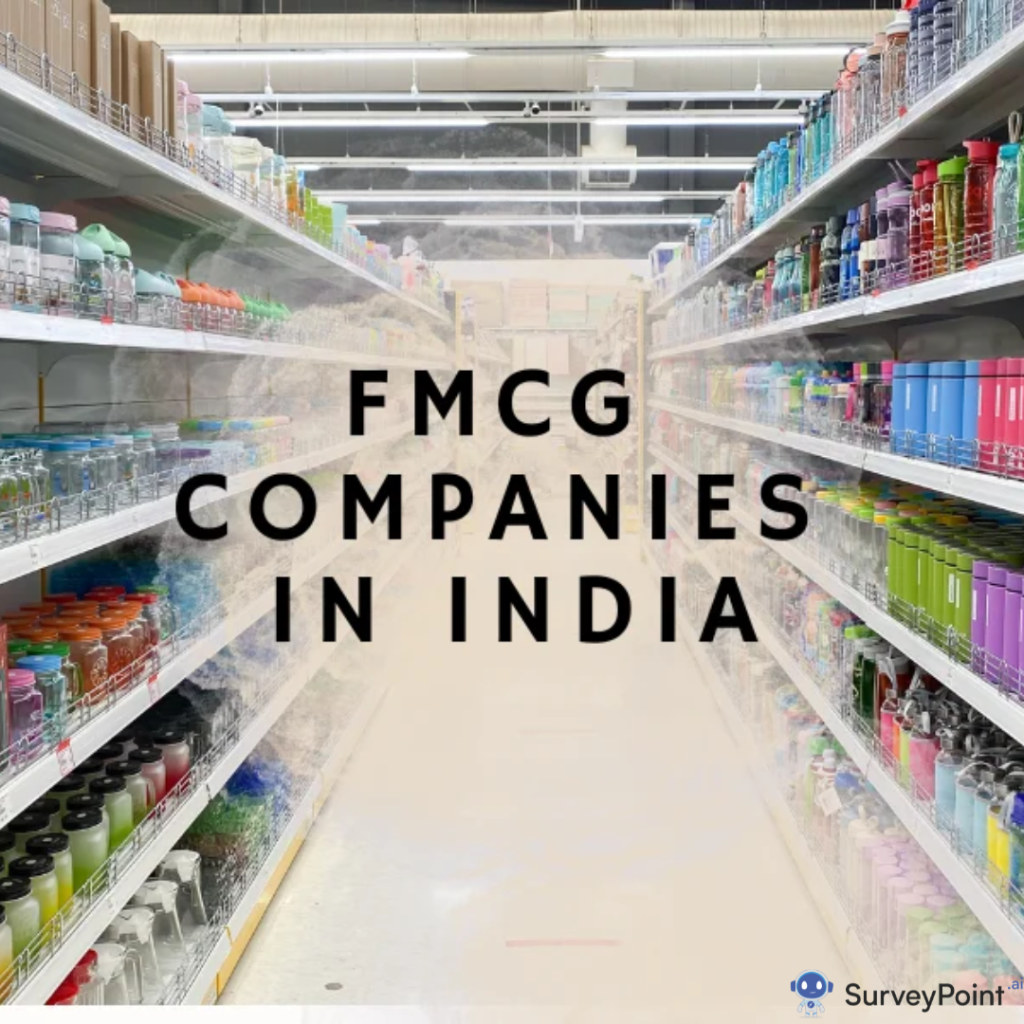
India’s Fast-Moving Consumer Goods (FMCG) sector is one of the largest industries in the country, with products that touch almost every household, from packaged foods and beverages to personal care and home essentials. The rapid growth of India’s population, increasing consumer spending, and evolving lifestyles have made the FMCG sector highly competitive.
The top FMCG companies in India have risen to prominence through innovative strategies, robust distribution networks, and a keen understanding of consumer needs. In this blog, we explore some of the leading FMCG companies in India and the strategies that have propelled them to the top.
1. Hindustan Unilever Limited (HUL)
Hindustan Unilever Limited (HUL) is the largest FMCG company in India, boasting a portfolio of iconic brands like Dove, Lux, Surf Excel, and Lipton. HUL’s presence in categories such as personal care, home care, foods, and refreshments allows it to cater to a wide range of consumer needs.
Key Strategies:
- Strong Brand Portfolio: HUL’s strength lies in its diverse brand portfolio, catering to various segments of the market from premium to mass-market products. The company regularly refreshes its brand lineup, introducing new products and variants based on evolving consumer preferences.
- Consumer-Centric Innovation: HUL’s innovation is driven by deep consumer insights. For instance, its “Pureit” water purifiers addressed the need for affordable, safe drinking water in India. Similarly, the launch of environmentally friendly products like “Love Beauty & Planet” aligns with the growing demand for sustainable products.
- Rural Expansion: HUL has aggressively expanded its presence in rural India through initiatives like the “Shakti” program, which employs rural women as sales representatives to increase product penetration in remote areas.
- Digital Transformation: The company’s digital initiatives, like leveraging e-commerce and direct-to-consumer channels, have been crucial in driving sales during the pandemic and beyond. HUL also uses data analytics for efficient supply chain management and personalized marketing.
2. ITC Limited
ITC Limited is a diversified conglomerate with a significant presence in the FMCG space. While ITC is well-known for its tobacco products, it has successfully diversified into packaged foods, personal care, and stationery with brands like Aashirvaad, Sunfeast, Fiama, and Classmate.
Key Strategies:
- Portfolio Diversification: ITC’s success in the FMCG space is largely due to its aggressive expansion beyond tobacco. The company has focused on building a strong portfolio of food brands, including Aashirvaad (flour and spices), Sunfeast (biscuits and noodles), and Bingo! (snacks), which are household names in India.
- Backward Integration: ITC’s agri-business division plays a key role in supporting its FMCG segment. The company has adopted a backward integration model to source raw materials directly from farmers, ensuring quality control and cost efficiency.
- Sustainability and Innovation: ITC is highly focused on sustainability, with initiatives like water conservation, afforestation, and renewable energy use. It’s also tapping into India’s growing health-conscious market with the launch of healthier alternatives such as low-sugar biscuits and organic food products.
- Omnichannel Strategy: ITC has been expanding its reach through both traditional retail and online platforms. Its e-commerce efforts, along with its loyalty programs, are helping ITC cater to both urban and rural consumers.
3. Nestlé India
Nestlé India is one of the most trusted FMCG companies in India, particularly known for its food and beverage brands like Maggi, Nescafé, and KitKat. The company’s product line is extensive, spanning instant noodles, coffee, dairy products, chocolates, and infant nutrition.
Key Strategies:
- Focus on Nutrition: Nestlé’s strategy revolves around creating products that are not only tasty but also nutritious. Its “Nutrition, Health & Wellness” strategy aims to reformulate products with lower sugar, salt, and fat content, addressing consumer health concerns.
- Brand Loyalty and Innovation: Nestlé leverages the strength of its iconic brands, such as Maggi, by consistently innovating and launching new variants. For example, Maggi’s range of products, including atta noodles and masala variants, keeps the brand relevant in the face of changing consumer tastes.
- Rural Penetration: Nestlé has developed strategies to increase its reach in rural areas by offering smaller, more affordable packaging options and tailoring its distribution network to reach tier 2 and 3 towns.
- Digital Initiatives: Nestlé has ramped up its presence in digital spaces, including e-commerce platforms and direct-to-consumer channels. The company also uses digital campaigns to engage with younger, tech-savvy consumers.
4. Dabur India Limited
Dabur India Limited is synonymous with natural and Ayurvedic products. It is a leader in personal care, health care, and food products, with popular brands like Dabur Chyawanprash, Dabur Honey, Real Juice, and Vatika.
Key Strategies:
- Ayurveda and Natural Focus: Dabur’s emphasis on Ayurvedic and herbal products sets it apart from many of its competitors. Its product range, including Chyawanprash, honey, and hair oils, aligns with the growing consumer demand for natural and wellness-based products.
- Product Innovation: Dabur continues to innovate by introducing products that merge tradition with modern consumer preferences. For instance, the launch of sugar-free Chyawanprash and organic honey addresses both health-conscious consumers and those looking for authenticity in natural products.
- Distribution Network: Dabur has one of the most extensive distribution networks in India, especially in rural areas. This wide reach, combined with deep market penetration, has helped Dabur maintain its position as a leading FMCG player in India.
- Health and Wellness: With the growing shift toward health and wellness, Dabur is expanding its product lines to include immunity-boosting supplements, Ayurvedic healthcare products, and organic food, all of which are gaining traction among health-conscious consumers.
5. Britannia Industries
Britannia Industries is one of India’s leading food companies, known for its bakery products like biscuits, bread, cakes, and dairy products. Brands like Good Day, Marie Gold, and NutriChoice have made Britannia a household name.
Key Strategies:
- Premiumization: Britannia has been focusing on premium products to increase its margins. The company has launched high-end variants of its existing products, such as the premium Good Day Cookies and NutriChoice Digestive Biscuits, which target health-conscious and affluent consumers.
- Innovation in Product Lines: Britannia has expanded its product portfolio by introducing newer products like flavored dairy drinks, cheese, and croissants. It has also ventured into the health and wellness segment with its “NutriChoice” range of digestive and low-sugar biscuits.
- Focus on Dairy: In line with its strategy to diversify beyond biscuits, Britannia has been expanding its dairy segment. The company is investing in dairy plants and aims to become a significant player in the dairy industry in India.
- Cost Efficiency and Distribution: Britannia’s focus on operational efficiency and expanding its distribution network, particularly in rural India, has been key to its growth. The company has also increased its presence in modern retail and e-commerce channels, catering to the changing shopping habits of consumers.
Conclusion: The Road Ahead for India’s FMCG Sector
India’s FMCG sector continues to grow, driven by factors such as increasing disposable incomes, urbanization, and evolving consumer preferences. The top FMCG companies are not just competing on price and product quality but are adopting innovative strategies to stay ahead.
Whether it’s Hindustan Unilever’s focus on sustainability, ITC’s diversification, Nestlé’s nutritional products, Dabur’s Ayurvedic offerings, or Britannia’s premiumization strategy, these companies are at the forefront of change in India’s dynamic FMCG landscape.
By staying attuned to consumer demands, expanding into rural markets, leveraging digital transformation, and prioritizing sustainability, these giants continue to drive growth and shape the future of the FMCG industry in India. For more information checkout- surveypoint.ai




